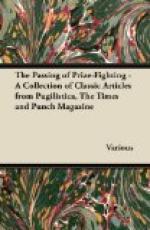[Illustration: HILARITY OF MR. CHURCHILL ON HEARING HIS CHIEF’S VIEWS ABOUT RUSSIA.]
Lord HUGH CECIL raised the standard of economy, and complained that the legislative programme was extravagantly long. “A large number of Bills generally meant a large amount of expenditure.” I have myself observed this phenomenon.
Wednesday, February 11th.—The Lords, having disposed of the Address with their usual celerity, welcomed Baron RIDDELL of Walton Heath (and, perhaps I may add, Bouverie Street) to their ranks, and then adjourned for a week.
If all Labour Members possessed the sweet reasonableness of Mr. BRACE we should view the advent of a Labour Government without any of Mr. CHURCHILL’S misgivings. The Member for Abertillery argued the case for the nationalisation of mines so gently and genially that before he sat down I am sure that a good half of his hearers began to think that, after all, there was “something in it.” Visions of a carboniferous millennium, when there would be no more strikes and hardly any accidents, and altruistic colliers would hew their hardest to get cheap and abundant coal for the community, floated before the mind’s eye as Mr. BRACE purred persuasively along.
[Illustration: THE PIED PIPER OF ABERTILLERY
(MR. W. BRACE).
“FOR HE LED US, HE SAID, TO A JOYOUS LAND
WHERE WATERS GUSHED AND FRUIT-TREES GREW,
AND FLOWERS PUT FORTH A FAIRER HUE,
AND EVERYTHING WAS STRANGE AND NEW.”]
Unfortunately for the Nationalisers Mr. LUNN thought it necessary later to make a blood-and-thunder oration, threatening all sorts of dreadful things (including a boycott of the newspapers) if the Miners’ demands were refused. Moreover, he made it clear that coal was only a beginning and that the Labour Party’s ultimate objective was nationalisation all round, and wound up by reminding the House that “we are many and ye are few.”
The PRIME MINISTER is not the man either to miss a chance or refuse a challenge. The tone of his reply was set by Mr. LUNN, not by Mr. BRACE; and though he had plenty of solid arguments to advance against the motion the most telling passage in his speech was a quotation from “Comrade TROTSKY,” showing what Nationalisation had spelt in Soviet Russia—labour conscription in its most drastic shape. The nation, he declared, that had fought for liberty throughout the world would stand to the death against this new bondage.




